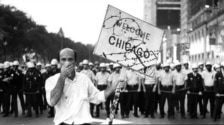BTN News: The Democratic National Convention (DNC) of 2024 is set to be another milestone in Chicago’s long history as a host for major political events in the United States. This marks the 26th time the city has been chosen for such an event, making it the most frequent host city for political conventions in U.S. history. Chicago has previously been the backdrop for both Republican and Democratic conventions, including significant moments like the 1860 Republican convention that launched Abraham Lincoln’s bid for the presidency and the tumultuous 1968 Democratic convention. The latter left a deep scar in the city’s memory due to the violent clashes between police and anti-war protesters, and it took almost three decades for the Democrats to return to the “Windy City.”
The 2024 DNC bears some striking parallels to the 1968 convention, particularly in terms of political upheaval and public dissent. Much like in 1968, the nation is once again grappling with a controversial war—this time in the Middle East, where the Biden administration’s support for Israel in its conflict with Hamas in Gaza has sparked widespread protests. These protests, reminiscent of those during the Vietnam War, reflect the intense dissatisfaction among segments of the population, especially among younger Americans. The conflict has already claimed over 40,000 Palestinian lives, fueling anger and protests that are expected to converge in Chicago, just as they did over half a century ago.
One of the most notable parallels between the two conventions lies in the unexpected twists in the nomination process. In 1968, President Lyndon B. Johnson shocked the nation by announcing he would not seek re-election, citing the deep divisions caused by the Vietnam War. His decision paved the way for Vice President Hubert Humphrey to secure the Democratic nomination, despite not participating in the primary elections. Similarly, in 2024, President Joe Biden, under mounting pressure from within his party over concerns about his age and capacity to serve another term, decided to step down from his re-election bid. His support then shifted to Vice President Kamala Harris, who, like Humphrey, did not compete in the primaries but was chosen as the Democratic nominee through a virtual vote before the convention.
However, while these parallels are striking, there are also significant differences between the DNCs of 1968 and 2024. The Democratic Party of 1968 was deeply fractured, torn apart by differing views on the Vietnam War and a general sense of disillusionment. In contrast, today’s Democratic Party, while facing its own set of challenges, appears more united, particularly in its support of Kamala Harris as the presidential candidate. The party has rallied around her, energized by the prospect of electing the first woman president in U.S. history, reflecting a stark contrast to the bitter divisions that plagued the party in the late 1960s.
The echoes of 1968 are also heard in the anticipated protests. In 1968, Chicago became a battleground as 10,000 anti-war protesters clashed with twice as many police officers under the heavy-handed control of Mayor Richard J. Daley. The images of violence and chaos that ensued shocked the nation and the world, leaving an indelible mark on the city’s history. Fast forward to 2024, and the potential for large-scale protests looms once again. With thousands expected to descend on Chicago to protest the ongoing conflict in Gaza, the city has ramped up its security measures. Unlike in 1968, when local law enforcement bore the brunt of maintaining order, today’s conventions are classified as National Special Security Events, with the U.S. Secret Service taking the lead in security operations. Despite these heightened security measures, there is significant concern that history could repeat itself if tensions boil over.
The role of media coverage has also evolved dramatically since 1968. During that turbulent convention, Mayor Daley took steps to stifle press coverage, including failing to resolve a strike at the local phone company, which severely hampered reporters’ ability to communicate with their newsrooms. The lack of immediate, widespread media coverage meant that much of the chaos on the streets of Chicago was underreported at the time. In contrast, the 2024 convention will unfold in the age of digital media, where smartphones and social media platforms will ensure that every moment is captured and broadcast in real-time. This shift in how news is reported and consumed presents new challenges, particularly in managing the potential spread of misinformation.
Ultimately, while the DNC of 2024 and that of 1968 share some historical parallels, they also reflect the vast changes that have taken place in American politics, media, and society over the past half-century. Chicago, a city with a rich political history, once again finds itself at the center of the nation’s political discourse. The coming weeks will determine whether the lessons learned from the past can help the city navigate the challenges of the present, as it prepares to host yet another historic Democratic National Convention.


